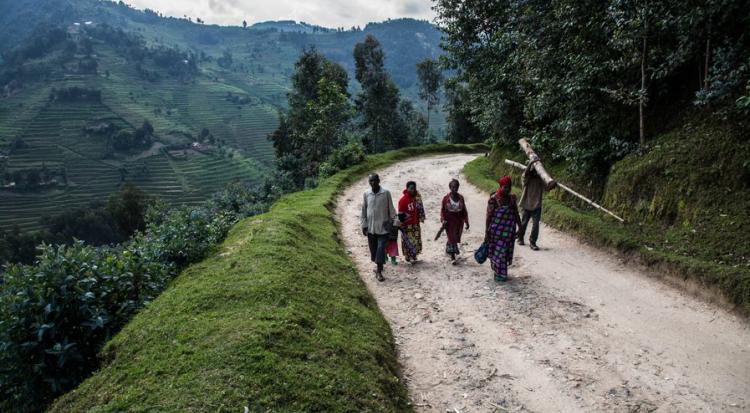-
Ci-Dev has achieved more than 350,000 tons of C02 reductions through 13 clean energy access programs, six of which have had issuances of Certified Emission Reductions (CERs)—representing almost half of the portfolio.
-
Ci-Dev delivers climate co-benefits to beneficiaries through clean energy access programs ranging from low-carbon cooking programs in Lao PDR, Madagascar, and Rwanda, biodigester programs in Ethiopia and Burkina Faso, micro-hydro programs in Kenya, to solar energy and rural electrification programs in Ethiopia, Kenya, Mali, Senegal, and Uganda.
-
The portfolio expects to reduce 6 million tons of CO2 equivalent and provide more than 200 MW of low-carbon energy by 2025.
As of March 2021, the Carbon Initiative for Development (Ci-Dev) has achieved more than 350,000 tons of carbon dioxide (C02) reductions through 13 clean energy access programs—twelve in Sub-Saharan Africa and one in Asia. Of these, six have had issuances of Certified Emission Reductions (CERs)—representing almost half of the portfolio.
Ci-Dev is a World Bank trust fund that mobilizes private finance for clean energy access in low-income countries. It delivers Result-Based Climate Finance to innovative and transformative business models driven by the private sector utilizing the Clean Development Mechanism (CDM) set out by the United Nations Framework Convention on Climate Change (UNFCCC). Climate co-benefits are achieved through clean energy access programs ranging from low-carbon cooking programs in Lao PDR, Madagascar, and Rwanda, biodigester programs in Ethiopia and Burkina Faso, micro-hydro programs in Kenya, to solar energy and rural electrification programs in Ethiopia, Kenya, Mali, Senegal, and Uganda.
In Ethiopia, carbon revenues from the sale of nearly 35,000 CERs to Ci-Dev are helping the National Biogas Program of Ethiopia to promote the use of biogas digesters. Biogas digesters convert manure and organic household waste into a clean fuel that can be used for cooking, offsetting the use of more polluting fuels. The sale of another 40,000 CERs, earned by replacing kerosene lamps and diesel generators with solar lanterns and solar home systems in households that are not connected to the electrical grid, is being used to strengthen after sale service for those solar products. More CERs will be generated as the program progresses.
The first programmatic CDM issuance for Burkina Faso, the sale of more than 85,000 CERs, is the first of approximately 325,000 expected from the West Africa Biodigesters Program. Generated by the installation of biogas digesters in rural Burkina Faso, the carbon revenues are making it possible for the National Biogas Program to disseminate information on the benefits of biodigesters for clean cooking and agricultural improvement, train masons on biodigester construction, and conduct quality control measures.
In Madagascar, Ci-Dev is supporting the government in its effort to promote ethanol as a clean cooking fuel to reduce deforestation. The revenue from the sale of over 176,000 CERs to Ci-Dev—the first programmatic CDM issuance in the country—is helping to subsidize the cost of ethanol stoves, allowing local partners to offer an alternative to the traditional wood burning stoves at an affordable price. Ci-Dev financing also aims to train local communities and entrepreneurs to produce and sell the fuel for these ethanol stoves, which can be generated from sugar cane and other crops grown on degraded and disused land.
The sale of carbon credits to Ci-Dev is helping to subsidize the cost of ready boards for low-income households in rural Uganda, where the rate of electricity access is just 11 percent. The ready board—an electrical panel from which electricity is distributed that contains provisions for electrical outlets and lighting sockets—dispenses with the need for the standard meter and conventional in-house wiring, providing a lower cost option for low-income households. On-grid connections implemented under Uganda’s Rural Electrification Strategy have generated more than 26,000 CERs to date, creating the funding for the subsidy and educational activities such as customer mobilization campaigns and marketing.
In addition to reducing 6 million tons of CO2 equivalent, Ci-Dev programs also provide low-carbon energy and community benefits. Often called co-benefits—these additional advantages from results-based climate finance programs include opportunities for women and girls gained when there is less demand on their time to collect solid wood fuels for cooking and heating; decreased illness and death when household air pollution is reduced as more efficient stoves are adopted; new jobs and commercial activity when businesses and entrepreneurs have greater access to reliable energy sources; lowered greenhouse gas emissions when reliance on kerosene and diesel fuels are minimized; and support for healthy forests with a diminished need for charcoal and wood fuels.
While Ci-Dev has made tangible progress on the implementation of its portfolio, additional gains—and climate co-benefits—are expected in the coming year.

